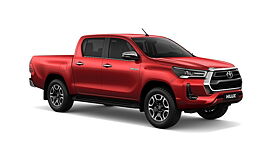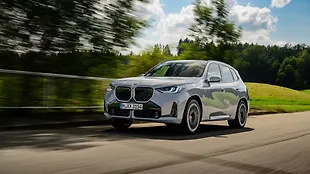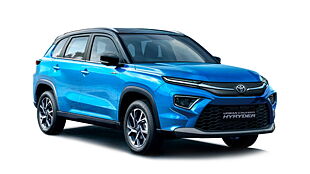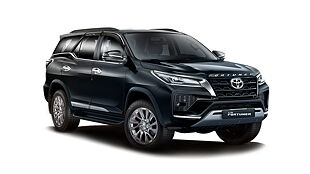Introduction

Specifications –
Make/Model - Toyota Hilux 2.8-litre AT
Tyre Size and Brand - Bridgestone Dueler 265/60 R18
Ground Clearance - 220mm
Off-Road Hardware -
4WD with High (H4) and Low (L4) Range paired with electronic 2WD/4WD control
Traction Control
Auto-limited slip differential
Hill descent control
Electronic differential lock
More details, including on-road price -

I'm smitten by pickup trucks and their versatility. So, there's no second guessing what I chose when the Toyota Hilux made it to the line-up of the fourth edition of CarWale's annual off-road day. In fact, it was the only massive pickup amongst SUVs here. To cope with the bulk, it has a 2.8-litre turbo diesel engine producing 200bhp and 500Nm of torque. All this power is routed through a six-speed torque converter automatic to the four-wheel-drive system. The latter gets High (H4) and Low (L4) range paired with electronic 2WD/4WD control. Despite the length, it has good approach (29.22degree) and departure (26.36degree) angles and runs on stock Bridgestone tyres (265/60 R18). Let's see how it performed.

CarWale Off-Road Day Tests Explained

First, let’s have a quick rundown of the tests. To begin with, we have the acceleration test that involves a straight off-road patch where the car accelerates from a standstill and brakes within a short distance. This provides a first-hand experience of how things change when not on a tarmac, and instead, on loose soil.
Also, how effectively the car puts the torque down to be able to gain momentum before a steep hill climb. Getting up a hill might be a task, but getting down a very steep one is a bigger challenge. That’s where our hill descent test comes into the picture, showing the car’s capability of slowly and safely coming down on its own.
A slalom test shows the vehicle’s capability of turning around and weaving through obstacles. Our slalom track was a good mix of dirt and grass. Your off-roader might have a rock-solid suspension to take on rough terrain with ease, but does it keep the occupants stable and comfortable? Our beaker test measures that with the amount of water that spills. Finally, a timed lap of the off-road track portrays how quick the vehicle is to escape from tricky situations. So, that’s a total of five tests that bring out all that an off-roading vehicle will have to face out there in the wild.
How the Toyota Hilux Performed
Acceleration test

With a start line made of loose soil and small stones, I had no hopes that the Hilux would be able to have a good start without its wheels spinning at the same spot. And with 2WD, the rear wheels felt like a cat scampering for grip with its hind legs on a smooth floor. After a little fish-tailing, this pick-up darted ahead towards the finish line, leaving a huge trail of dust behind. The Hilux recorded 5.06 seconds in Vikrant's first sprint in the Sport mode, and 4.84 seconds in the Normal drive mode.
The Power mode was active in both runs but the Sport mode took a while as the gearbox held on to the revs till the redline. On the other hand, in the Drive mode, it shifted up to provide some more boost. I tried the same run in 4WD and managed it in 4.63 seconds. This showed that the car managed to send power to all the wheels and moved ahead with zest with reduced wheel spin. This Toyota wasn't the slowest of the lot but with three other cars posting a quicker time, it lost crucial points right at the start.

| Mercedes-Benz G Wagon | 4.47 seconds |
| Land Rover Defender | 4.50 seconds |
| Maruti Jimny | 4.50 seconds |
| Toyota Hilux | 4.84 seconds |
| Mahindra Thar | 5.06 seconds |
| MG Gloster | 5.09 seconds |
Slalom test

Another heartbreak coming up was in the case of the slalom. Imagine a car with the longest wheelbase manoeuvring around tightly placed cones. The other cars with a compact footprint and tight overhangs definitely had a clear advantage over the Hilux. And as luck would have it, the start line again had some loose soil – just like the acceleration test. But then, this time the slalom was designed to provide a mix of a little dirt and grass. So, the Hilux had bits where it could find grip and get in line instead of struggling on the dusty surface. However, the steering required quite a lot of effort and the kickback didn't help either. It's a long and heavy vehicle after all, and that could really be felt from behind the wheel. Being amongst the slowest to complete this test is nothing less than a heartbreak.

| Mercedes-Benz G Wagon | 13.53 seconds |
| Maruti Jimny | 13.93 seconds |
| Land Rover Defender | 13.97 seconds |
| Mahindra Thar | 14.19 seconds |
| Toyota Hilux | 15.53 seconds |
| MG Gloster | 16.00 seconds |
Beaker test

To further dampen my spirits, we had the beaker test to indicate how stable it keeps the passengers inside. Now, the double wishbone suspension setup at the front and a leaf spring rigid axle one at the rear speak of the car's solid and robust nature in tackling any terrain. However, the thing with pick-ups or with such a setup is that they work well with a good payload. But with no load at the back, the rear keeps bouncing and moving sideways if you don't go slow. Our test involved completing the task in the quickest way possible. With Vikrant not planning on slowing down for a fair comparison with all vehicles, the results were quite obvious as I could not save the water from spilling. By saving only 360ml, the Hilux turned out to be last on the list and scored the least.
| MG Gloster | 430ml |
| Land Rover Defender | 420ml |
| Mercedes-Benz G Wagon | 390ml |
| Mahindra Thar | 380ml |
| Maruti Jimny | 380ml |
| Toyota Hilux | 360ml |
Hill descent

How steadily a vehicle can face a steep incline or a decline shows how good it is off the road. This hill descent test portrayed exactly this, and I was confident the Hilux would perform with its 4LO hardware paired with descent control (DAC). At the top, just before the steep inline, I realised the side-step might touch due to the protruding edge. However, despite the long wheelbase, the ground clearance was good enough for it to not scrape and the Hilux started showing off its true colours. Apart from engine braking, the electronics were smartly braking every wheel to not let them jam and slip. I trusted the vehicle and it managed to overpower its weight, slowly gripping the stock tyres, and got down in 18.69 seconds. This is impressive for the heaviest of the vehicles, but unfortunately, two other cars did it slower, displacing the Hilux from the top spot.
| Land Rover Defender | 41.97 seconds |
| Mercedes-Benz G Wagon | 29.50 seconds |
| Toyota Hilux | 18.69 seconds |
| Mahindra Thar | 17.69 seconds |
| Maruti Jimny | 15.16 seconds |
| MG Gloster | 14.00 seconds |
Timed lap

There was no hope for me to recover from the lost points, but I was pretty sure the Hilux would be able to perform well, if not win. And it did. This timed lap involved a little straight stretch, some tight right-handers including a U-turn, and a muddy patch. The sprint was good but the Hilux surprised me by taking the U-turn without a three-point turn. A wider entry pointing towards the apex and the rear sliding out to position the car back on the track did the trick. It was flawless even in the muddy patch, making all the other sections seem easy-peasy, and landing amongst the fastest laps.

| MG Gloster | 51.62 seconds |
| Mercedes-Benz G Wagon | 51.72 seconds |
| Land Rover Defender | 55.68 seconds |
| Toyota Hilux | 59.37 seconds |
| Mahindra Thar | 59.40 seconds |
| Maruti Jimny | 1 minute, 06.60 seconds |
Conclusion

Apart from the fun we had, the Hilux's length and weight, and the steering requiring quite some effort, made it sacrifice speed and agility around the tight sections. But never did the vehicle have issues in putting the power down quickly and the automatic gearbox complemented it well. The suspension did a fantastic job of taking all the beating and the electronics and well-tuned ABS managed to anchor down the vehicle when needed. However, unlike the Hilux, the lighter, more powerful, and compact vehicles didn't suffer that much. I wish we had the prepped-up Hilux with knobby tyres and a lift-up kit to straight up win this tough fight in this course that we set. Nevertheless, the standard Hilux would still be the most fun in comfortably ferrying five passengers along with plenty of luggage and a motorcycle/quad bike in the bed behind.

Pictures by Kapil Angane and Kaustubh Gandhi



































